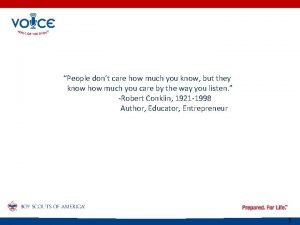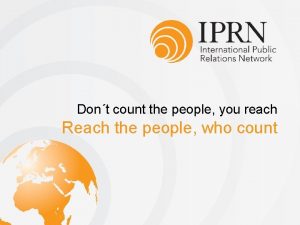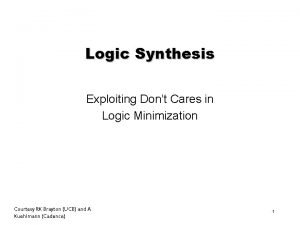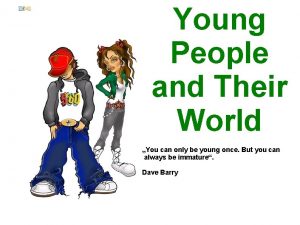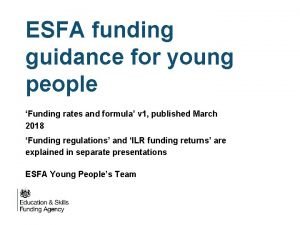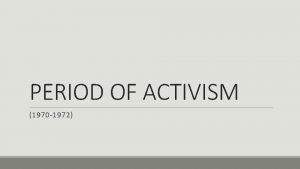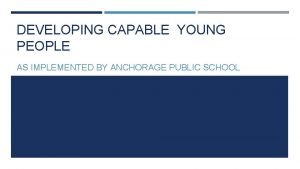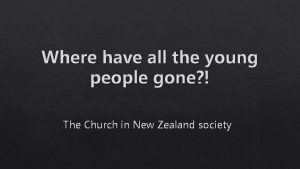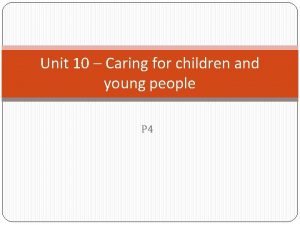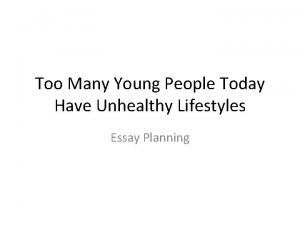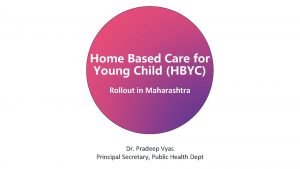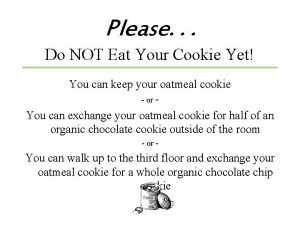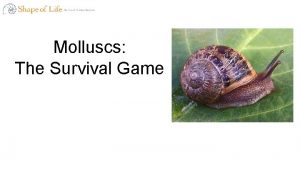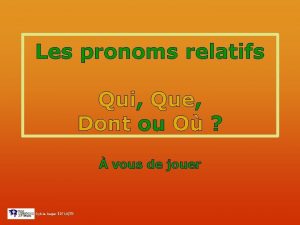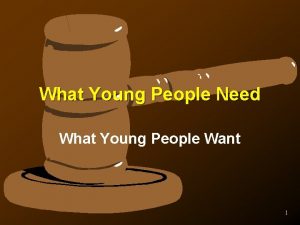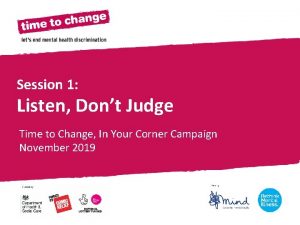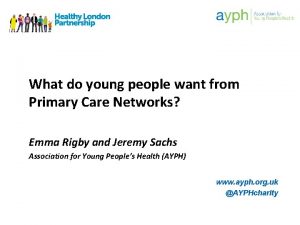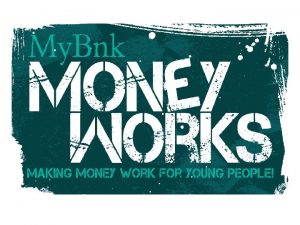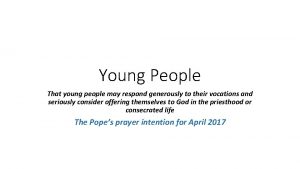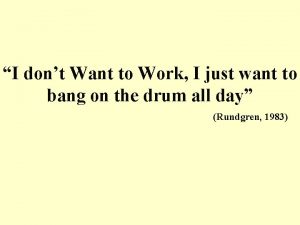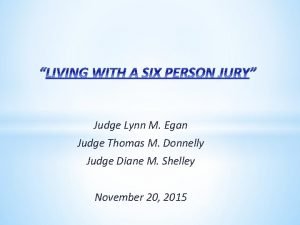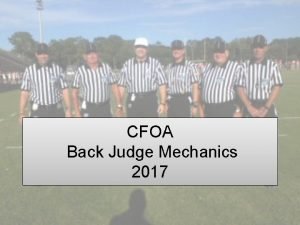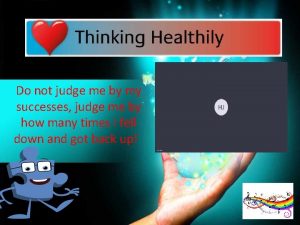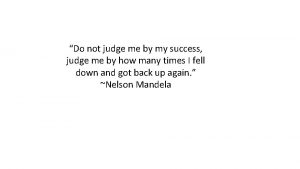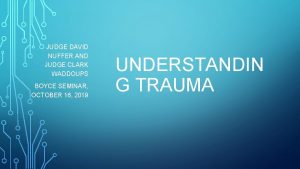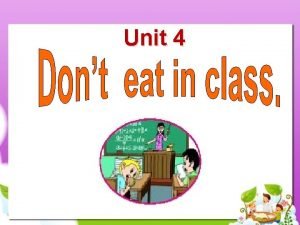Dont judge Listen Care What young people want
























- Slides: 24

Don’t judge. Listen. Care: What young people want when feeling suicidal Dr Samantha Batchelor QFCC Research in the Round February 2018

• free 24/7 helpline for children and young people aged 5 – 25 years • Phone, webchat or email • Any time, any reason • One off information or referral, ongoing counselling and crisis support • Professional counsellors • More than 75% self-funded by the yourtown Art Union, donations and corporate support

Outline of presentation • Suicidal thoughts can start young • Why don’t young people seek help? • Why don’t young people receive help? • The importance of family • Young people’s messages for service providers

Kids Helpline contacts 2012 -2016 Ø 59 053 counselling contacts related to suicide Ø 49154 (83. 2%) suicidal thoughts and fears Ø 2717 (4. 6%) expressing an immediate intent Ø 1039 (1. 8%) current attempt at time of contact Ø 5 772 (9. 8%) concerned for another Note: contacts individuals

Consultation with children and young people with lived experience 2015 -2016 • Online survey, 472 respondents • Age: 0 -13 yrs 21% 14 -16 yrs 30% 17 -19 yrs 20% 20 and over 14% • 78% female, 17% male, 5% other • 22% identified as LGBTIQ and a further 21% preferred not to say • 7% Aboriginal and/or Torres Strait Islander; 91% spoke English at home • 73% major cities, 19% inner regional, 7. 5% outer regional or remote • 80% had made a suicide plan and 55% had attempted suicide (self-reported)

Help-seeking for suicide Deaths from suicide 2500 16. 0 2000 N of young people 12. 0 8. 0 4. 0 0 -14 yrs 15 -19 yrs 1500 1000 20 -24 yrs 500 Suicide rate by 5 -year age group, ABS 2016 data 0 5 6 7 8 9 10 11 12 13 14 15 16 17 18 19 20 21 22 23 24 25 Age KHL contacts by age (first contact only), 2012 -2017

Kids Helpline 2016: • 57 individuals aged 14 or younger received a duty of care intervention • Counsellors responded to an average of 2. 3 contacts per week from a child 14 or younger expressing an immediate intent to suicide or engaged in an attempt at the time of contact

Point 1: • suicidal thoughts can start young • this isn’t well-reflected in publicly available data • we need more data about the prevalence of suicidal thoughts and behaviours in children

57% Who did you tell? I told someone how I as feeling How did you get help? Friend 36% Counsellor 33% Parent 18% Helpline 17% 60% of 31% respondents Someone had never noticed any received how I was help feeling 20% Not until after I attempted suicide Who noticed? Parent 35% Friend 26% School staff 19%

Did you receive help when you were thinking about suicide? Yes No 14 and younger 26% 74% 15 – 19 42% 58% 20 and over 61% 39% Age (n=138) (n=191) (n=82) ( 2 (2, 329)=26. 421, p=. 000)

Point 2: • Many young people receive no support until after they attempt suicide • Younger children are even less likely to receive support (particularly professional support) • Need education/training to increase awareness and recognition of early signs

Why don’t young people seek help? STIGMA ‘I didn’t want to be judged or thought of differently. There’s such a stigma about it so I just kept quiet. ’ MYTH OF ATTENTION SEEKING ‘Every time I think of telling someone, I immediately think they will joke about it and say I'm lying and an attention seeker. ’ FEELING WORTHLESS ‘Didn’t think anyone could be bothered and that they had more important things to worry about. ’ CONCERN FOR OTHERS ‘It’s hard to tell the people who care about you that you just can’t stand being alive anymore …. . I don’t want to hurt her. I don’t want to be a burden. ’

Young people need adults, including professionals, to be more proactive ‘If people saw through my smile and realized it was fake a lot of the time ……. . if professionals picked up the vibe more often then maybe I'd be in a better place ……… often I may be trying to hint towards how I'm feeling without actually saying it as I may be too embarrassed or worried about being judged. ’ ‘I just want someone to ask me if I ever had suicidal thoughts, my reply will be yes. No one really knows how sad I am. ’

Why don’t young people receive help? Myth of attention seeking ‘My parents assume I’m okay and I’m just trying to get attention and they think I’m trying to be “that person” when I really honest need help. ’ ‘When I went to my so called best friend she made me feel so much worse. All she said was that I was being an attention seeker and needed to grow up and deal with my problems. ’ Disbelief ‘[my dad] tries to tell me to stop being stupid or silly because to him it's just a teen thing’ ‘When I first told my mum I was depressed she said I was too young and that I was being stupid. ’

Not being taken seriously After building up the courage to reach out to my mum to tell her I was feeling suicidal and that I really needed help, all she said was "Try not to worry so much". The [school] counsellor just told me it was puberty and made me read a book about puberty which made me feel like my problems weren’t real. I went to a GP who would not give me a mental health care plan because I would not show her my self-harming. She was rude and patronizing and put me off seeking professional help for a couple of years. She implied that I was making everything up. I felt stupid and small and ashamed.

Sources of support: Who needs education and training? (N=192) N Very helpful % Fairly helpful % Not at all helpful % Telephone counselling 102 52 33 15 Psychologist/counsellor 115 44 38 17 Friend(s) 117 41 45 14 School counsellor or teacher 93 37 37 27 Online 95 36 45 19 Hospital 70 30 29 41 Psychiatrist 84 29 39 32 GP 100 25 43 32 Parent 116 22 35 44 Other family 70 14 39 47

Families are crucial • Parents were the people most likely to be mentioned by young people up to the age of 19, and second most likely to be mentioned by young adults 20 years and over • Consistent with the quantitative data, most mentions of parents described unhelpful behaviour 0 -14 year olds 75% unhelpful 15 -19 year olds 88% unhelpful 20+ year olds 86% unhelpful

Point 3: • Parents are crucial sources of support for young people of all ages, but many don’t know how to respond • Encouraging help-seeking without ensuring others respond appropriately can do harm • Education to increase understanding of mental ill health and suicide is needed – communitywide, but particularly for parents and medical

What does help? • Professional counselling and psychological treatment • Caring relationships

Caring relationships One face to face counsellor I had always used to call to check up on me the next day. That made me feel important and valuable. The fact that she [counsellor] has always been there for me whenever I called was very powerful. It demonstrated to me that I am important and that the person I was talking to cares about me. The conversation [with a counsellor] felt exactly like one I would have had with my Grandad ………. I have used it whenever I doubted how many people truly care for me as I can never say he didn’t go above and beyond his duty to support me. My worker was a god send. Even when I didn’t say anything because I was so scared she stayed and didn’t give up on me.

What advice would you give to services? LISTEN! Try to actually understand what's going on. Stop jumping to medications and diagnosing everything. Be non-judgemental - really. And treat them like a valued person, not a patient. Sympathize with them, be Just be there to listen to them. Nurture them, support them and just care for them. We just want to feel like we are wanted. empathic, cry with them, make them feel important and make them feel like their problems are worth being like that.

Point 4: • Professional counselling and psychological services are effective – if young people have access to them • Demonstrating a caring relationship with the young person is an intrinsic part of any support whether that be in a hospital emergency department, at school, at the GP or with family and friends • Demonstrating a caring relationship can take extra effort – going above and beyond what

• Key implications for policy and practice Start early – suicidal thoughts can begin young • More data about the prevalence of suicidal thoughts and behaviours in children • Professional services do make a difference, but many children and young people are not receiving the help they need • Reducing stigma and dispelling the myth of attention seeking is crucial. • More education and training, particularly for parents, school staff and medical professionals. • More policy and program responses that enhance the capacity of parents/carers to support their children. • Service delivery needs to be underpinned by a caring relationship that is actively demonstrated to the young person. • Young people want to be heard – we need to provide opportunities and listen

Don’t judge. Listen. Care. Dr Samantha Batchelor sbatchelor@yourtown. com. au Papers reporting consultation with young people: www. yourtown. com. au/insights/advocacy Statistical overviews of contacts with Kids Helpline: www. yourtown. com. au/insights/annual-overviews
 Dont ask dont tell political cartoon
Dont ask dont tell political cartoon Don't laugh at me allen shamblin
Don't laugh at me allen shamblin People dont care
People dont care I just wanna be a sheep
I just wanna be a sheep Listen to the pouring rain listen to it pour
Listen to the pouring rain listen to it pour Dont count on people
Dont count on people Verilog dont care
Verilog dont care I dont care ascii
I dont care ascii I dont care ascii
I dont care ascii Words for dont care
Words for dont care Health care levels primary secondary tertiary
Health care levels primary secondary tertiary Diskriminatori
Diskriminatori The young and their world
The young and their world Esfa funding
Esfa funding 1970-1972
1970-1972 Developing capable young people
Developing capable young people Where have all the young people gone
Where have all the young people gone Unit 10 caring for children and young people
Unit 10 caring for children and young people Tim too many young people are
Tim too many young people are Hbyc age limit
Hbyc age limit What they don t know won t hurt them
What they don t know won t hurt them Dont lequel
Dont lequel Please dont eat my cookie
Please dont eat my cookie Squidgain
Squidgain Dont ou où
Dont ou où


